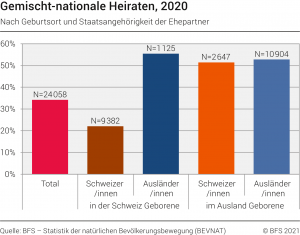Allgemeine Informationen
Home › Informationen › Allgemeine Informationen
Was ist ein binationales Paar?
Wir sprechen von einem binationalem Paar, wenn zwei Menschen mit unterschiedlicher Nationalität in einer Beziehung zusammen leben.
Binationale Beziehungen, eingetragene Partnerschaften und Ehen sind längst nicht mehr nur individuelle Lebensentwürfe, sondern das Ergebnis wirtschaftlicher, politischer und gesellschaftlicher Entwicklungen. Binationalen Partnerschaften und Familien kommt eine wichtige gesellschaftliche Bedeutung zu, und mit zunehmender Globalisierung wird ihre Zahl weiter steigen. Diese transnationalen Beziehungen führen zu einem subtilen demografischen Wandel in unserer Gesellschaft. Sie leisten einen wichtigen Integrationsbeitrag und erfüllen eine gesellschaftlich wertvolle Aufgabe im Dienste eines echten Multikulturalismus.
Wie viele binationale Paare gint es in der Schweiz?
Laut dem Bundesamt für Statistik (BFS) waren im Jahr 2020 insgesamt 34 % der in der Schweiz geschlossenen Ehen gemischtnational, wobei ein Ehepartner einen Schweizer Pass besass. Im Ausland geborene Schweizer Staatsangehörige heirateten mehr als doppelt so häufig eine Person mit ausländischer Staatsangehörigkeit als ihre in der Schweiz geborenen Landsleute (51 % gegenüber 22 %). Mehr als die Hälfte der Ehen zwischen Ausländern (im Ausland oder in der Schweiz geboren) wurden mit Schweizer Staatsangehörigen geschlossen (zwischen 53 % und 55 %).

Die oben genannten Statistiken umfassen weder im Ausland geschlossene Ehen noch zusammenlebende Paare oder eingetragene Partnerschaften.
Weitere Informationen zu statistischen Daten finden Sie hier
Was ist bei binationalen Paaren anders als bei nicht-binationalen Paaren?
Ein binationales Paar muss zahlreiche rechtliche, soziale, kulturelle und finanzielle Hürden überwinden, um zusammenleben zu können. Gelingt dies, kann eine binationale Beziehung umso bereichernder sein. Im Folgenden finden Sie eine nicht vollständige Liste von Merkmalen binationaler Paare:
Rahmenbedingungen
Aus Aufenthaltsgründen müssen binationale Paare oft schon nach kurzer Zeit eine Heirat oder eingetragene Partnerschaft in Betracht ziehen, da ein Zusammenleben in der Schweiz ohne Heirat oder eingetragene Partnerschaft nicht möglich ist (ausgenommen EU-Bürger). Mit anderen Worten: Oft fehlt die Zeit, sich kennenzulernen, sich mit dem sozialen und kulturellen Hintergrund des Partners vertraut zu machen oder sich in der Schweiz einzuleben.
Beziehung
Binationale Paare unterscheiden sich nicht grundlegend von Paaren, die denselben kulturellen Hintergrund haben. Bei beiden ist jeder Mensch eine Welt für sich. Jeder Mensch wird in einem bestimmten sozialen, historischen und kulturellen Kontext sozialisiert, und die vorherrschenden Werte bestimmen die Entwicklung des Individuums. Bei binationalen Paaren sind diese Kontexte und die damit verbundenen Werte und Einstellungen jedoch in der Regel unterschiedlicher als bei nicht-binationalen Paaren. So haben binationale Paare zu Beginn ihrer Beziehung keinen gemeinsamen kulturellen Hintergrund, weniger gemeinsame Bezugspunkte in Bezug auf Werte und Normen und oft keine Sprache, die beide Partner gleich gut beherrschen. Zusätzlich zu den normalen Beziehungsproblemen müssen sich binationale Paare daher häufiger mit diesen Themen auseinandersetzen. Das kann einerseits eine Herausforderung sein, andererseits aber auch lehrreich und aufschlussreich.
Umfeld/Integration
Das Leben in einer binationalen Beziehung bedeutet in der Regel, das Heimatland, die Familie und das vertraute kulturelle Umfeld eines Partners zu verlassen. In einem fremden Land muss sich die Person neu orientieren, sich an veränderte Alltagsstrukturen anpassen und ein neues soziales Umfeld aufbauen. Die Integration im neuen Wohnsitzland hängt von vielen Faktoren ab, die nicht alle vom Paar beeinflusst werden können. So kann es für den ausländischen Partner beispielsweise schwierig sein, einen Arbeitsplatz zu finden, der seinen beruflichen Qualifikationen entspricht. Daraus können finanzielle Probleme resultieren, die eine weitere Herausforderung für die Partnerschaft darstellen. Für eine erfolgreiche binationale Partnerschaft müssen beide Partner ihre Werte und Normen überdenken und im Laufe der Zeit ihre eigene binationale Identität als Paar finden. Die Menschen in der Herkunftsfamilie oder im Freundeskreis können dies nicht immer nachvollziehen. Manchmal sind zusätzliche Anstrengungen erforderlich, damit die Partnerschaft von den Menschen im Umfeld akzeptiert wird.
Sprache
Binationale Paare kommunizieren oft in einer Sprache, die mindestens einer von ihnen nicht vollständig versteht. Dies erschwert die Kommunikation und das gegenseitige Verständnis auf emotionaler Ebene erheblich. Wenn eine Person ihre Muttersprache spricht, entsteht ein Ungleichgewicht, das die Kommunikation belasten kann. Missverständnisse, die aus Sprachschwierigkeiten entstehen, werden nicht immer als solche erkannt. Die Mehrsprachigkeit in der Familie bietet jedoch auch die Möglichkeit, eine Fremdsprache im Alltag zu lernen und gemeinsamen Kindern die Chance zu geben, mehrsprachig aufzuwachsen – ein unschätzbarer Vorteil in Zeiten zunehmender Globalisierung.
Religion
Religion prägt eine Gesellschaft und das Rechtssystem eines Landes. Religion ist mitverantwortlich für die Werte und Normen, die für das Zusammenleben gelten. Das gilt auch für Menschen, die sich selbst als nicht religiös betrachten. Mit Offenheit und Toleranz können verschiedene Religionen ihren Platz in einer Partnerschaft oder Familie haben. Es ist wichtig, der Religion des Partners mit Offenheit und Interesse zu begegnen und herauszufinden, welchen Einfluss Religion auf den Alltag und die Partnerschaft haben soll. Wenn ein binationales oder interreligiöses Paar gemeinsam Kinder haben möchte, sollte die Frage der Religion auf jeden Fall frühzeitig mit einbezogen werden.